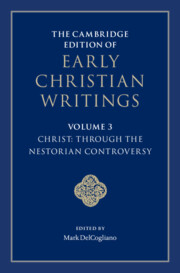Book contents
- The Cambridge Edition of Early Christian Writings
- The Cambridge Edition of Early Christian Writings
- The Cambridge Edition of Early Christian Writings
- Copyright page
- Contents
- Notes on Contributors
- Acknowledgments
- Note on the Texts and Translations
- Abbreviations
- Series Introduction
- Introduction
- Part I The Beginnings of Christology
- Part II Developing Christological Traditions
- Part III Traditions of Pro-Nicene Christology
- 21 Tome to the Antiochenes 7
- 22 Athanasius of Alexandria, Christological Letters to Epictetus, Adelphius, and Maximus
- 23 Apollinarius of Laodicea, Recapitulation
- 24 Apollinarius of Laodicea, Selected Letters
- 25 Apollinarius of Laodicea, On the Faith and the Incarnation
- 26 Apollinarius of Laodicea, On the Body’s Union with the Divinity in Christ
- 27 Apollinarius of Laodicea, Fragments of Other Writings
- 28 Apollinarius of Laodicea, Fragmentary Writings against Diodore and Flavian
- 29 Basil of Caesarea, Letters 261 and 262
- 30 Basil of Caesarea, Homily on the Holy Birth of Christ
- 31 Diodore of Tarsus, Selected Fragments
- 32 Gregory of Nazianzus, Letter 101 to Cledonius
- 33 Gregory of Nazianzus, Poems 1.1.10–11
- 34 Gregory of Nyssa, Oration on the Savior’s Nativity
- 35 Theodore of Mopsuestia, On the Incarnation of the Lord against the Apollinarians and Eunomians (Fragments)
- 36 Augustine of Hippo, On Eighty-Three Different Questions. Number 80: Against the Apollinarians
- 37 Augustine of Hippo, Letter 137
- 38 The Leporius Dossier
- 39 Theodoret of Cyrrhus, Exposition of the Orthodox Faith
- Part IV Controversy over Nestorius
- Suggestions for Further Reading
- Scriptural Index
27 - Apollinarius of Laodicea, Fragments of Other Writings
from Part III - Traditions of Pro-Nicene Christology
Published online by Cambridge University Press: 05 February 2022
- The Cambridge Edition of Early Christian Writings
- The Cambridge Edition of Early Christian Writings
- The Cambridge Edition of Early Christian Writings
- Copyright page
- Contents
- Notes on Contributors
- Acknowledgments
- Note on the Texts and Translations
- Abbreviations
- Series Introduction
- Introduction
- Part I The Beginnings of Christology
- Part II Developing Christological Traditions
- Part III Traditions of Pro-Nicene Christology
- 21 Tome to the Antiochenes 7
- 22 Athanasius of Alexandria, Christological Letters to Epictetus, Adelphius, and Maximus
- 23 Apollinarius of Laodicea, Recapitulation
- 24 Apollinarius of Laodicea, Selected Letters
- 25 Apollinarius of Laodicea, On the Faith and the Incarnation
- 26 Apollinarius of Laodicea, On the Body’s Union with the Divinity in Christ
- 27 Apollinarius of Laodicea, Fragments of Other Writings
- 28 Apollinarius of Laodicea, Fragmentary Writings against Diodore and Flavian
- 29 Basil of Caesarea, Letters 261 and 262
- 30 Basil of Caesarea, Homily on the Holy Birth of Christ
- 31 Diodore of Tarsus, Selected Fragments
- 32 Gregory of Nazianzus, Letter 101 to Cledonius
- 33 Gregory of Nazianzus, Poems 1.1.10–11
- 34 Gregory of Nyssa, Oration on the Savior’s Nativity
- 35 Theodore of Mopsuestia, On the Incarnation of the Lord against the Apollinarians and Eunomians (Fragments)
- 36 Augustine of Hippo, On Eighty-Three Different Questions. Number 80: Against the Apollinarians
- 37 Augustine of Hippo, Letter 137
- 38 The Leporius Dossier
- 39 Theodoret of Cyrrhus, Exposition of the Orthodox Faith
- Part IV Controversy over Nestorius
- Suggestions for Further Reading
- Scriptural Index
Summary
The ecclesiastical condemnation of Apollinarius of Laodicea (ca. 315–392) resulted in few of his writings surviving intact, unless they had been transmitted under the names of church fathers of unimpeachable orthodoxy such as Gregory Thaumaturgus, Julius of Rome, and Athanasius of Alexandria.1 However, fifth- and sixth-century writers such as Theodoret of Cyrrhus, Leontius of Byzantium, Emperor Justinian, and others still had access to more texts than we do today, and in works of Christological polemics they excerpted passages from the writings of Apollinarius to demonstrate his problematic views. Thus more than 150 fragments of Apollinarius are extant, preserved mainly in these polemical tracts. A selection of these fragments is translated here. Though they derive from various writings of Apollinarius about which little or nothing is known, these fragments have been selected because they bring out the most distinctive features of his Christology.2 And yet, since these fragments were quoted by those who preserved them precisely because they were deemed to reveal the most controversial aspects of Apollinarius’s Christology, they must be interpreted with care and caution (particularly 111 and 113).
- Type
- Chapter
- Information
- The Cambridge Edition of Early Christian Writings , pp. 333 - 338Publisher: Cambridge University PressPrint publication year: 2022

